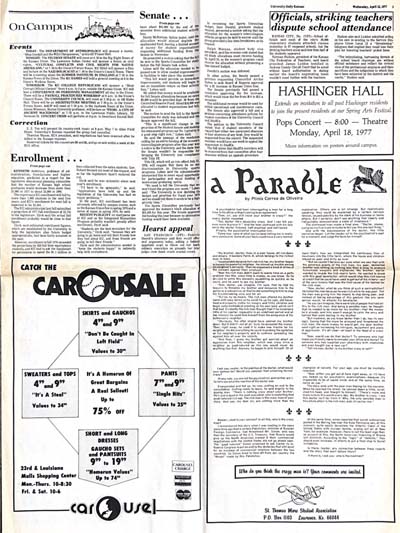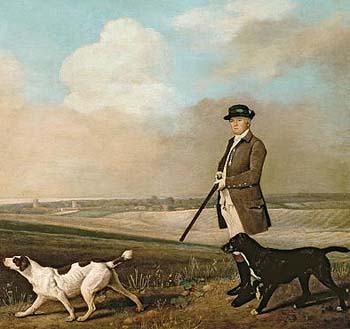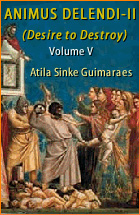Talks with Jan
 |
 |
 |
 |
 |
 |
 |
Who Is the Madman? A Parable
My friend Jan and I were discussing the communist indigenous movements in South America that recently made revolutions in the streets, along with the Black Lives Matter and lawlessness that run rampant here in the United States. We noted how the government and Church are promoting, protecting and funding these revolutionary movements instead of combating them to protect the law-abiding citizens. In the name of “social justice,” real justice is set aside.

 Sadly the Catholic Church leads the way on this communist pathway, always striving to make the rich feel guilty and to encourage the poor to demand more.
Sadly the Catholic Church leads the way on this communist pathway, always striving to make the rich feel guilty and to encourage the poor to demand more.
How many times have we heard Francis denounce the “structures of sin,” which would mean any institution, group or person who correctly upholds any inequality in society, principally that existing between the rich and the poor.
This reminded me of an episode from my distant past.
The year was 1977. I had returned to Kansas University to take a class in Portuguese in order to read and translate articles of Prof. Plinio Corrêa de Oliveira. I and a few other students started a small counter-revolutionary group and named ourselves the St. Thomas More Student Association. We decided to publish an article that countered the prevailing communist spirit of the day in a paid advertisement in the The University Daily Kansan.
We chose to print a Parable titled “Who’s the Madman” written by Prof. Plinio Corrêa de Oliveira. Its moral lesson was one that aptly applied then, when the United States was making one concession after another to its enemies China and Russia in commerce negotiations to maintain “good relations.” The lesson, as you will see, continues to apply to our days, when in the name of goodness and social justice, every benefit is given to criminals and the lawless, who in response only make more demands and become more violent.
The Parable was published in an almost half page ad in the Wednesday, April 13, 1977 edition of The University Daily Kansan, paid for by my mother Mary Frances Horvat and my dear friend Dr. Remi Amelunxen, both deceased and whose memory I honor now with their mention.
 What happened? The greatest protest came not from the notoriously communist Student Union, but from the St. Lawrence Catholic Student Center, a vanguard of Progressivism on the campus. We had no right to call ourselves the St. Thomas More Association, the chaplain Fr. Vince complained, and were in no way associated with the Catholic Center, or for that matter, the Catholic Church, which was committed to “social justice” and “détente.”
What happened? The greatest protest came not from the notoriously communist Student Union, but from the St. Lawrence Catholic Student Center, a vanguard of Progressivism on the campus. We had no right to call ourselves the St. Thomas More Association, the chaplain Fr. Vince complained, and were in no way associated with the Catholic Center, or for that matter, the Catholic Church, which was committed to “social justice” and “détente.”
Gladly would we have replied, but suddenly, the extremely tolerant Daily Kansan refused to accept any more of our paid advertisements. Our next “Parable” was already in the works, and suddenly we were told The St. Thomas More Student Association no longer had access to the “free press.”
At any rate, my good friend Jan was curious to read the Parable, and so I publish it here below for her and for the benefit of my readers. Let them judge how aptly it fits our situation today.
A Parable by Plinio Corrêa de Oliveira
A psychiatrist had been interrogating a man for a long time in his office without coming to any agreement.
“You insist, then, that your brother is crazy?” the weary doctor repeated.
“Yes, doctor. He is absolutely crazy. And I can tell you even more to prove it.” And the man continued his tiresome tale as the doctor listened, somewhat skeptical and annoyed. At a certain point, the psychiatrist interrupted him: “Come now, nothing you are saying is conclusive. Some of these facts could have a quite normal explanation. Others are admittedly a bit strange. But, realistically speaking, they could be explained by some type of nervous tension caused by his business or home affairs. I do not see anything that clearly and indisputably demonstrates a state of imbalance”
The distressed man made a final plea: “Doctor, please, give me five more minutes to tell you just this one last thing.”
And, with the doctor's acquiescence, the narration began.
Let the reader place himself in the psychiatrist’s seat for a moment, and judge the facts for himself.
*
“Doctor, my brother lives in a poor dilapidated house next to the estate of Mr. X, the richest man in the city. Inconsolable because he himself was not rich, my brother began to harass his powerful neighbor. He stirred up unrest among his neighbor’s employees, and incited them to go on strike.
 “Now, the rich man did not want to waste time over such a petty problem. After all, time is money. He settled the domestic strife as best he could, and then went to see my brother.
“Now, the rich man did not want to waste time over such a petty problem. After all, time is money. He settled the domestic strife as best he could, and then went to see my brother.
“Now, doctor, you would think that Mr. X would tell his attorneys to threaten my brother or denounce him to the police as a subversive. You think he would start a lawsuit against him to make him stop his troublemaking once and for all.
“But, no, by no means. Do you know what he did? Exactly the opposite! The rich man offered to arrange credit for my brother so that he could fix up his old house and properly feed and clothe his hungry, poorly dressed children. He also provided funds so that my brother could efficiently cultivate his own land, which has good soil.
“Evidently, the rich landowner thought that if he invested a little of his capital, repayable at low interest for an indefinite term, he would be free from the annoyance of my troublesome brother. This arrangement should have satisfied my brother. But he was by no means content! He accepted the offer of the money, which he promptly used to further incite unrest that was brewing on the rich man's property and to sow dissatisfaction with him throughout the countryside.
 “Moreover, he began to purchase arms to 'defend' himself against an attack from his neighbor, which was crazy since a neighbor as kind as this one would never think of such a thing. At least, that's how we all interpreted the constant flow of handguns to his small farm where the house and children remained as poor and unkept as ever.
“Moreover, he began to purchase arms to 'defend' himself against an attack from his neighbor, which was crazy since a neighbor as kind as this one would never think of such a thing. At least, that's how we all interpreted the constant flow of handguns to his small farm where the house and children remained as poor and unkept as ever.
“But we could not believe our eyes when we saw the workshop for the production of arms and small explosives that my poor demented brother had built with the generous funds from the rich man. My brother, Doctor, wants to invade the rich man's estate, which would end this rich source of credit that could permit him to rise from his misery – from that very misery that was the cause of his hatred for the rich man.
“Do you not see the contradiction, Doctor? My brother hated the rich man because he was rich while my brother was poor. The man gives him the means to improve his situation, and, instead of taking advantage of this gesture like an sane person would, my brother attacks his benefactor.
“As you can imagine, it took no time at all for news of my brother's plan to reach the rich man. And, since he is a very sensible man, he came to the conclusion that envy and hatred were boiling in my brother's heart because the gifts already made to my brother had not been generous enough.
 “But madness, as you know, has its own logic. Seeing that the more he annoyed and threatened the rich man, the more money he got, my poor brother continued to increase his stockpile of weapons and multiply his intrigues and subversive plans of aggression. It makes sense – at least to the mind of a madman.
“But madness, as you know, has its own logic. Seeing that the more he annoyed and threatened the rich man, the more money he got, my poor brother continued to increase his stockpile of weapons and multiply his intrigues and subversive plans of aggression. It makes sense – at least to the mind of a madman.
“Now then, would you do that, Doctor, to someone who made you friendly loans to remodel your office and home, filled your closets with clothes and your cupboards with food, and even bought you a new car?
“Tell me now, Doctor, is my brother crazy or not?”
*
I ask you, reader, if you were in the doctor's position, what would your opinion be? Would you think that the poor ill-tempered brother was crazy?
In any case, neither of us is the psychiatrist. So let us return to the story to see what his reaction was.
Exasperated and annoyed, the Doctor rose, putting an immediate end to the consultation. As he prepared to leave, he sternly addressed the stupefied man: “There is nothing crazy about your brother. He is a skilled scoundrel who is exploiting his simple-minded rich neighbor. The latter is the real madman in the story. And you, my friend, are so naïve that, considering your age, I hold your own sanity suspect!
“Now, either you leave this office immediately, or I will have you locked up for psychiatric examinations, because it is impossible for anyone to be of sound mind and so naïve at the same time.”
The story ends with the man making a hasty flight for the elevator. When he reached the street, he calmed down a bit, scratched his head, and thought to himself: “The world is full of madmen. My brother is crazy. I see that this doctor is not far from it. Why, the only sane person in all this is the rich man. And, of course, myself.”
Reader, what is your opinion? Who is the madman?



Above, revolutionaries in Paris; below, Black Lives Matter in Seattle; next, Quito indigenous groups rioting in streets. In all cases, the police were ordered to ‘stand off’

How many times have we heard Francis denounce the “structures of sin,” which would mean any institution, group or person who correctly upholds any inequality in society, principally that existing between the rich and the poor.
This reminded me of an episode from my distant past.
The year was 1977. I had returned to Kansas University to take a class in Portuguese in order to read and translate articles of Prof. Plinio Corrêa de Oliveira. I and a few other students started a small counter-revolutionary group and named ourselves the St. Thomas More Student Association. We decided to publish an article that countered the prevailing communist spirit of the day in a paid advertisement in the The University Daily Kansan.
We chose to print a Parable titled “Who’s the Madman” written by Prof. Plinio Corrêa de Oliveira. Its moral lesson was one that aptly applied then, when the United States was making one concession after another to its enemies China and Russia in commerce negotiations to maintain “good relations.” The lesson, as you will see, continues to apply to our days, when in the name of goodness and social justice, every benefit is given to criminals and the lawless, who in response only make more demands and become more violent.
The Parable was published in an almost half page ad in the Wednesday, April 13, 1977 edition of The University Daily Kansan, paid for by my mother Mary Frances Horvat and my dear friend Dr. Remi Amelunxen, both deceased and whose memory I honor now with their mention.

The Parable, as published in The University Daily Kansan
To enlarge click here
Gladly would we have replied, but suddenly, the extremely tolerant Daily Kansan refused to accept any more of our paid advertisements. Our next “Parable” was already in the works, and suddenly we were told The St. Thomas More Student Association no longer had access to the “free press.”
At any rate, my good friend Jan was curious to read the Parable, and so I publish it here below for her and for the benefit of my readers. Let them judge how aptly it fits our situation today.
A psychiatrist had been interrogating a man for a long time in his office without coming to any agreement.
“You insist, then, that your brother is crazy?” the weary doctor repeated.
“Yes, doctor. He is absolutely crazy. And I can tell you even more to prove it.” And the man continued his tiresome tale as the doctor listened, somewhat skeptical and annoyed. At a certain point, the psychiatrist interrupted him: “Come now, nothing you are saying is conclusive. Some of these facts could have a quite normal explanation. Others are admittedly a bit strange. But, realistically speaking, they could be explained by some type of nervous tension caused by his business or home affairs. I do not see anything that clearly and indisputably demonstrates a state of imbalance”
The distressed man made a final plea: “Doctor, please, give me five more minutes to tell you just this one last thing.”
And, with the doctor's acquiescence, the narration began.
Let the reader place himself in the psychiatrist’s seat for a moment, and judge the facts for himself.
“Doctor, my brother lives in a poor dilapidated house next to the estate of Mr. X, the richest man in the city. Inconsolable because he himself was not rich, my brother began to harass his powerful neighbor. He stirred up unrest among his neighbor’s employees, and incited them to go on strike.

An amiable landowner surveying his lands
“Now, doctor, you would think that Mr. X would tell his attorneys to threaten my brother or denounce him to the police as a subversive. You think he would start a lawsuit against him to make him stop his troublemaking once and for all.
“But, no, by no means. Do you know what he did? Exactly the opposite! The rich man offered to arrange credit for my brother so that he could fix up his old house and properly feed and clothe his hungry, poorly dressed children. He also provided funds so that my brother could efficiently cultivate his own land, which has good soil.
“Evidently, the rich landowner thought that if he invested a little of his capital, repayable at low interest for an indefinite term, he would be free from the annoyance of my troublesome brother. This arrangement should have satisfied my brother. But he was by no means content! He accepted the offer of the money, which he promptly used to further incite unrest that was brewing on the rich man's property and to sow dissatisfaction with him throughout the countryside.

Instead of being placated by the owner's goodness, the revolted brother becomes more furious
“But we could not believe our eyes when we saw the workshop for the production of arms and small explosives that my poor demented brother had built with the generous funds from the rich man. My brother, Doctor, wants to invade the rich man's estate, which would end this rich source of credit that could permit him to rise from his misery – from that very misery that was the cause of his hatred for the rich man.
“Do you not see the contradiction, Doctor? My brother hated the rich man because he was rich while my brother was poor. The man gives him the means to improve his situation, and, instead of taking advantage of this gesture like an sane person would, my brother attacks his benefactor.
“As you can imagine, it took no time at all for news of my brother's plan to reach the rich man. And, since he is a very sensible man, he came to the conclusion that envy and hatred were boiling in my brother's heart because the gifts already made to my brother had not been generous enough.

He first incites the workers, then prepares to arm them
“Now then, would you do that, Doctor, to someone who made you friendly loans to remodel your office and home, filled your closets with clothes and your cupboards with food, and even bought you a new car?
“Tell me now, Doctor, is my brother crazy or not?”
I ask you, reader, if you were in the doctor's position, what would your opinion be? Would you think that the poor ill-tempered brother was crazy?
In any case, neither of us is the psychiatrist. So let us return to the story to see what his reaction was.
Exasperated and annoyed, the Doctor rose, putting an immediate end to the consultation. As he prepared to leave, he sternly addressed the stupefied man: “There is nothing crazy about your brother. He is a skilled scoundrel who is exploiting his simple-minded rich neighbor. The latter is the real madman in the story. And you, my friend, are so naïve that, considering your age, I hold your own sanity suspect!
“Now, either you leave this office immediately, or I will have you locked up for psychiatric examinations, because it is impossible for anyone to be of sound mind and so naïve at the same time.”
The story ends with the man making a hasty flight for the elevator. When he reached the street, he calmed down a bit, scratched his head, and thought to himself: “The world is full of madmen. My brother is crazy. I see that this doctor is not far from it. Why, the only sane person in all this is the rich man. And, of course, myself.”
Reader, what is your opinion? Who is the madman?

Workers of the Landless Movement in Brazil - supported
by the Bishops - march to take over
a ranch, expel the owners & claim it theirs.
Posted August 28 2023

______________________
______________________
 Volume I |
 Volume II |
 Volume III |
 Volume IV |
 Volume V |
 Volume VI |
 Volume VII |
 Volume VIII |
 Volume IX |
 Volume X |
 Volume XI |
 Special Edition |



